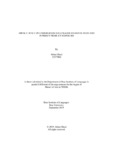Impact of ICT on undergraduate English students with and without prior ICT exposure
Abstract
Existing researches in the field of Applied Linguistics shows a significant interest in the application of advanced practices through usage of Information and Communications Technology (ICT) while teaching English as a second language. Therefore, the subject matter of resorting to the use of information and communications technologies (ICT) has been of significant concern and has created considerable discussion on ICT skills being an increased necessity. This study attempts to investigate the effects of ICT in the non-credit English for Academic Purpose classrooms at tertiary level education in the context of Bangladesh, i.e. Dhaka to be more precise. This research aims to look at the positive and negative effects that ICT has in terms of attitude, motivation and learning in EAP. To be clearer, this is an academic research that will help to see how the use of technology affects English language learning outcomes in the private educational institution of the tertiary level. For this research, I have conducted interviews with students and teachers in addition to observing classes to collect the data required to answer my research questions from two private tertiary level educational institutions. By having inductive research, I was able to narrow down my research and make it as specific as possible to help me understand the research participants’ state, attitude and motivation towards learning. After completing my research, the research findings have revealed that most of the participants, which include both students and teachers, view the implementation of ICT in EAP in a positive light. Both the students and teachers who participated agreed upon ICT significantly influencing the language learning processes and strategies. Although the study concludes ICT having positive effects when it comes to English language learning, nonetheless this study is also an attempt at identifying the challenges that comes with ICT application in EAP.
Keywords
Information and Communication Technology (ICT); English for Academic Purpose (EAP); EFL teaching; EFL learning; Motivation; Learner autonomyDescription
This thesis report is submitted in partial fulfilment of the requirements for the degree of Masters of Arts in Teaching to Speakers of Other Languages, 2019.Department
Brac Institutes of LanguagesType
ThesisCollections
- Thesis (M.A in TESOL) [113]

